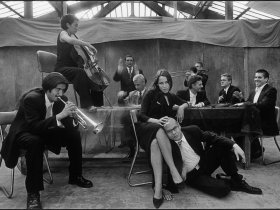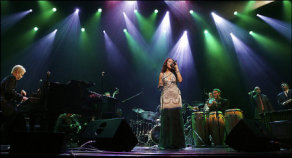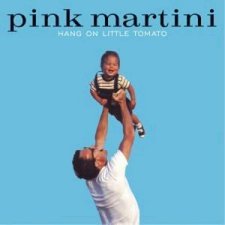September 23, 2006
__________________________________________________________
The Post's chief critic Tim Page reviewed Thursday's American debut of Nicholas Maw's opera "Sophie's Choice" today; he loved the music but thought the production still too long -- even after the extensive cuts.
"There remains the big, pragmatic, essential question -- does it work ?" he writes. "And here we break out the waffles, as my own answer, after one encounter, must be a qualified "sort of." I suspect that the score is even better than it sounded, melding consonance and chromaticism in a way that is lyrical, luminous and generally easy on the ear while remaining intellectually interesting throughout.
"And yet "Sophie's Choice," even after the considerable trimming it received following the premiere performances, remains a long evening in the theater -- almost 3 1/2 hours with one intermission. I don't know exactly what I would cut -- virtually nothing is shoddy or second-rate -- but something should go."
________________________________________________________________________
Christina Couch has an intriguing piece in the Christian Science Monitor on The Ambitious Orchestra, the Los Angeles-based daKAH Hip-Hop Orchestra, the Everyone Orchestra, and The Vienna Vegetable Orchestra -- groups that are all trying to find ways to get new listeners into classical concert halls.

Photo by Jason Bean
"Part symphony, part rock mega-ensemble, The Ambitious Orchestra (TAO) is the first and perhaps the only symphonic group in the world devoted exclusively to 'bringing the virtuosity back to rock and roll'," writes Couch. "Churning out original tunes covering the usual (and not-so-usual) hot topics of the genre, the 20-piece classically-trained ensemble - which includes string, wind, horn, and percussion sections - draws a mix of teen groupies, 20-something hipsters and their concerto-loving parents."
But it's the Vienna Vegetable Orchestra that really catches the attention. "After hearing everything from traditional African pieces to experimental electronic music played on instruments such as the "radish-marimba" and the "cucumberophone," the audience is treated to a hearty soup made from the vegetable scraps that didn't make it into the orchestra itself," says Couch.
_____________________________________________________
We had an absolute blast at Pink Martini's concert on Thursday night -- and so did everybody else, to judge by the roars of love that greeted every song. My only complaint is that China Forbes didn't sing "Lily" -- but they did play almost every other gem from "Sympathique" and "Hang on Little Tomato", plus a few pieces from their next album, still in the works but scheduled for February. Here's my review:
The Washington Post 9/23/06:
Does America need a Pink Martini?
Yes, please -- and right away, to judge from the wildly enthusiastic crowd at George Washington University's Lisner Auditorium on Thursday night. This 12-piece band from Oregon has been a major hit in Europe with its genre-busting mix of styles ranging from Brazilian sambas and Japanese film music to torch songs from the 1930s. Its two self-produced albums have sold more than a million copies around the world.
And at the sold-out Lisner show, where the band ended a rare North American tour, Pink Martini showed why it may be turning into the next big thing here, too. Opening with a smoldering, lounge-music version of Maurice Ravel's "Bolero," the band launched into a wild, two-hour ride through several decades and a dozen languages and styles -- a sort of "urban musical travelogue," as pianist Thomas Lauderdale puts it -- that was pure electricity from beginning to end.
Opening with a smoldering, lounge-music version of Maurice Ravel's "Bolero," the band launched into a wild, two-hour ride through several decades and a dozen languages and styles -- a sort of "urban musical travelogue," as pianist Thomas Lauderdale puts it -- that was pure electricity from beginning to end.
Lauderdale and singer China Forbes call themselves "musical archaeologists," digging up neglected treasures and styles from the past and reinventing them for the 21st century. But there's nothing pedantic about the result: This is rich, hugely approachable music, utterly cosmopolitan yet utterly unpretentious. And it seems to speak to just about everybody: The Lisner audience included everyone from grade-schoolers to grandmothers to the young and hip and beautiful.
Forbes delivered elegant accounts of more than a dozen of the band's favorites, including "Let's Never Stop Falling in Love" (which, like much of Pink Martini's music, she co-wrote with Lauderdale) and the swooning, heartfelt "Amado Mio," as well as new pieces like the 1934 song "Tempo Perdido," from the band's upcoming album -- tentatively scheduled for release in February.
Forbes has a fine, velvety voice, and though she may not yet have the richness and dramatic power of a great cabaret singer, she made up for it Thursday with style, sliding from sultry ballads into whispery Japanese melodies without a trace of effort. Throughout, she radiated a kind of femme-fatale-in-training charm -- the girl next door who's not quite sure how she ended up onstage but is going to make like a vamp anyway.
For all the sophistication of the music, there was an agreeably homespun atmosphere to Pink Martini's stage show. Pianist Lauderdale (as chic as could be in a short-sleeve shirt, bow tie and platinum-dyed hair) played with his back to the audience and only rarely displayed his virtuosity, giving the spotlight to the other band members -- with spectacular results. Cellist Pansy Chang's solo in the dark Croatian song "U Plavu Zoru" was pure dark honey, moody and evocative, while Gavin Bondy on trumpet, Robert Taylor on trombone and Dan Faehnle on guitar kept things storming through hard-driving tunes like "¿Donde Estas, Yolanda?" and "Una Notte a Napoli."

By James Wilderhancock
Lauderdale and Forbes believe the diversity of the band's members is at the heart of Pink Martini's musical eclecticism.
"It's really a result of the number of people in the band, who all come from different backgrounds, from classical to jazz to Brazilian to Cuban," Forbes said in a phone conversation from Cleveland last week, where the band was performing at the Museum of Art.
Both she and Lauderdale grew up in multicultural families -- she's partly African American, while Lauderdale (who calls himself a "mystery Asian") is one of four racially diverse adopted children.
"I grew up playing classical, and China's more folk-rock-pop," Lauderdale said. "And because everybody in the band has a voice and everybody writes music, it translates to quite a diverse repertoire."
Pink Martini got its start in 1994, when Lauderdale put a band together in Portland, Ore., to play at fundraisers for progressive causes. He invited Forbes to join him (the two had become friends while undergraduates at Harvard), and they began writing songs and released their first album, "Sympathique," in 1997. They weren't expecting much to happen ("we released it in a sort of 'Portland' way," said Forbes, laughing), but the lilting title song was picked up by Citroen for a commercial and became a huge hit in France -- launching the band's European career.
The extensive travel put them in the role of cultural diplomats, Lauderdale said.
2004's "Hang On Little Tomato""American pop culture sends a very particular image of what American culture is," he said. "I think the band represents a larger, more diverse America, so it's more authentic in that way."
Pink Martini's real mission, he said, is to deepen American pop music by exploring the past.
"One of the sad things about modern American culture is that there's not much awareness of history on the part of the younger generation," he said. "There's sort of a cultural and social and historical amnesia."
Lauderdale thinks that, in music, he's found an essential ingredient for surviving the 21st century.
"There's such optimism in the music from the past!" he said. "And if we're writing music in that style, the challenge is to find that true optimism -- despite everything that we've learned and everything that we know."